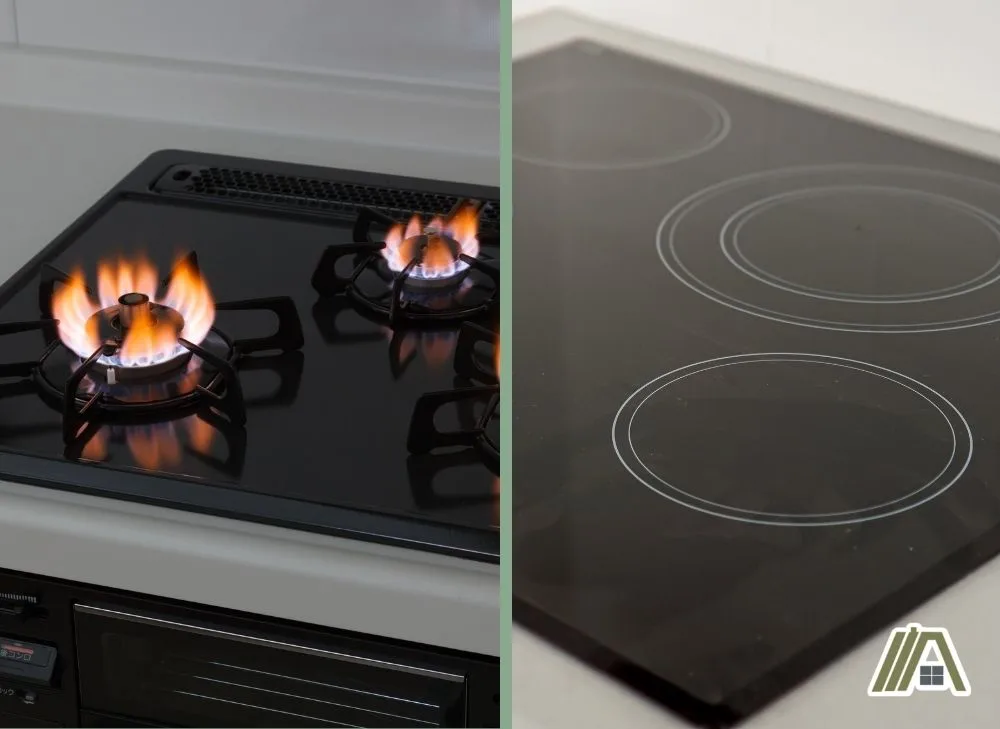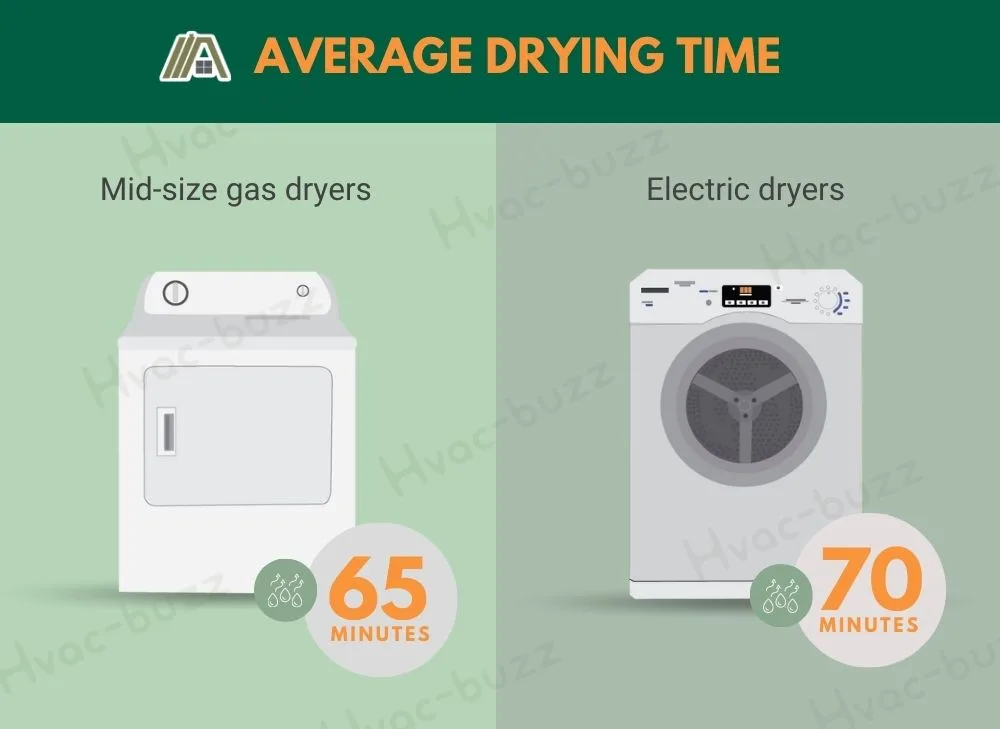Time seems to slow down when I’m waiting for a load of laundry to be done. Drying cycles can take upwards of an hour, but it feels like a day or two when I’m waiting for a specific piece of clothing to dry! When it’s time to replace my dryer, you can sure bet I’ll be finding the fastest one on the market.
Here, I’ve compiled a guide of factors that affect drying time, as well as a table comparing models from multiple brands.

Gas dryers are typically faster than electric dryers. Factors such as drum size, load size, dryer temperature, level of moisture in the load of laundry, and dryer condition can affect the drying time of a dryer.
Factors Affecting Drying Time
Drum Size
Drum size can affect drying time in a few different ways, depending on how you look at the situation.
Let’s first imagine you put the same size load in a small drum and a large drum. The laundry in the larger drum would dry faster because it has more space to move around within the dryer, and air is able to reach all the laundry more effectively.
But if you’re anything like me, you probably don’t put the same amount of laundry in the larger drum. People naturally tend to fill the drum up with more wet clothing.
Since a larger amount of clothes fit in the larger drum, there is more moisture to be removed. A larger drum size may actually increase the drying time in this case.
Load Size Compared to Drum Size
We must also take into account the load size in comparison to the drum size.
A large load of laundry will reduce the airflow in your dryer, and clothes will take much longer to dry. Additionally, the wet clothes can become too heavy for the dryer to tumble effectively.

A big drum with few clothes will allow for better airflow, and the air will also not be saturated with moisture as quickly. The air doesn’t have to be replaced as much, and the load will be done faster.
A dryer should never be filled more than ¾ full of laundry in order to prevent damage to the dryer and ensure proper drying of all clothing items.
How Wet the Clothes Are Going In
The initial moisture levels in the dryer affect how long it takes to run a cycle as well.
Soaking wet clothing obviously has more moisture than a load of laundry that has been wrung out or tumbled in the washing machine beforehand.
The dryer will take more time to remove the excess moisture, not only because of the extra water itself but also because the load of laundry will be heavier. This may prevent the dryer from rotating correctly, which can also lead to damage.
Heating Time
Heating time is a factor that is not thought of as readily as factors such as load size and water content of clothing. Nevertheless, it plays an important role in drying times.
Dryers that take longer to reach optimal temperatures will naturally take longer to dry the load of laundry.
Water evaporates much faster when it is heated to higher temperatures, so dryers that can heat up quickly have a head start on getting rid of that water.
Operating Temperature
In addition to heating time, the final temperature that your dryer reaches will also affect how long it takes to dry.
Dryers that operate at higher temperatures dry clothing more efficiently than lower-temperature dryers. The hotter air is able to evaporate water and remove it from clothing faster.
That being said, speed isn’t always the best thing.
Drying laundry at high temperatures can shrink your clothes, weaken the fabric, and fade its colors over time.

High temperatures are also harder on the dryer itself and may lead to additional maintenance costs.
Dryer/Duct Condition
Parts of the dryer outside of what’s happening in the drum itself also play an important role in determining the time it takes to dry a load of laundry.
Lint debris can build up in your dryer’s exhaust vent and limit how much saturated air can leave your dryer at a time.
If the saturated air cannot escape quickly, it will take longer for new unsaturated air to replace it, thus increasing the drying time.
Older models may also become less efficient over time. Years of wear and tear can make your dryer perform worse, and sometimes machines can become so clogged up that it makes more sense to replace it instead of repairing it.
Factors That Differ Between Gas and Electric Dryers
So, now we know all the factors that go into determining drying time, but how do these factors differ between gas and electric dryers?
Drum size, load size compared to drum size, how wet the clothes are going in, and dryer/duct condition can all vary but they tend to vary equally in gas dryers and electric dryers.
Whether or not your dryer is gas or electric, these factors will equally affect drying time. You can find gas and electric models that will fit whatever your preference is in regards to these factors.
On the other hand, heating time and operating temperature do not vary equally between gas and electric dryers.
Heating Times Compared
Electric dryers typically take longer to reach operational temperatures. It can take about 30 minutes for an electric dryer to heat up, while gas dryers can do so in as little as 15.
Gas dryers heat the air through a gas burner, while electric dryers use a heating element that raises the temperature of the air.
The gas burner, which provides heat through combustion, is more efficient than the electric heating element. The electric heating element takes more energy, and more time, to heat up. It also does not reach as high of a final temperature as the gas burner does.
You can imagine a gas stove compared to an electric stove. The gas stove’s flame causes an immediate temperature increase, while an electric burner may take a few minutes to get up to the same temperature.

This increased heating time can greatly increase the time a drying cycle takes, even if the electric dryer eventually reaches the same temperature as the gas dryer.
Operating Temperature Compared
Operating Temperatures of Midsize Dryers (7.0 and 7.4 cu. ft. capacities)
| Model | Gas or Electric | Operating Temperature | Drying time |
|---|---|---|---|
| Samsung – DVE45R6100 | Electric | 130°F | 67 mins |
| LG – WKHC202H*A | Electric | 143°F | 72 mins |
| GE – G78E_1_NB+ : GFV55ES*N*** | Electric | 135°F | 73 mins |
| Whirlpool – WED99HED*+ | Electric | 135°F | 71 mins |
| LG – DLEX7900*E | Electric | 143°F | 55 mins |
| Whirlpool – WED9290FW* | Electric | 135°F | 75 mins |
| Maytag – MED7230H** | Electric | 135°F | 74 mins |
| Kenmore – A20BCI8AG0 : 6165*20* | Electric | 125°F | 68 mins |
| Speed Queen – ADEE9***177T***Model Number Information | Electric | 125°F | 71 mins |
| GE – G78E_1_T : GFD65ES*N*** | Electric | 135°F | 74 mins |
| Electrolux – EFMG627**** | Gas | 150°F | 55 mins |
| LG – DLG3401* | Gas | 135°F | 70 mins |
| Amana – NGD5800H** | Gas | 155°F | 66 mins |
| Samsung – DV50K86**G* | Gas | 130°F | 65 mins |
| GE Profile – M73G_4_T : PTD90GB*T*** | Gas | 145°F | 61 mins |
| LG – DLG7151* | Gas | 135°F | 70 mins |
| GE – M60G_4_N : GUD27GE*N*** | Gas | 145°F | 63 mins |
| Speed Queen – ADGE9***117T*** | Gas | 155°F | 69 mins |
| LG – DLG7061*E | Gas | 135°F | 70 mins |
| Whirlpool – WGD9500EW* | Gas | 145°F | 61 mins |
Operating Temperatures of Large Dryers (8.0 cu. ft. and over)
| Model | Gas or Electric | Operating Temperature | Drying Time |
|---|---|---|---|
| Frigidaire – FDGX22E4EW | Electric | 125°F | 54 mins |
| Samsung – DV53BB89**H* | Electric | 133°F | 69 mins |
| GE – G78G_4_NA : GFD55GS*R*** | Gas | 145°F | 71 mins |
| Samsung – DV50K75**G* | Gas | 130°F | 64 mins |
Operating Temperatures of Small Dryers (6.0 cu. ft. and under)
| Model | Gas or Electric | Operating Temperature | Drying Time |
|---|---|---|---|
| GE – M60E_1_N : GUD27EE*N*** | Electric | 135°F | 64 mins |
| Asko – T411HS.W.U | Electric | 130°F | 80 mins |
| GE – M60G_4_N : GUD27GE*N*** | Gas | 145°F | 63 mins |
| Speed Queen – ADGE9***117T*** | Gas | 155°F | 69 mins |
Findings Explained
Gas dryers tend to run about 10 degrees hotter than electric dryers on similar dryer settings.
Mid-size gas dryers (7.0 and 7.4 cu.ft capacities) have an average drying time of 65 minutes, while electric dryers take about 70 minutes.

These calculations were made based on the dryer models listed in the table above. All of these dryers are Energy Star certified, meaning they use less energy than the standard product.
It is possible that gas dryers that are not Energy Star certified would make the difference in dry times even greater.
Some electric dryers reach the same temperature gas dryers, but they still take longer to dry clothes because of the time it takes them to heat up.
Conversely, some electric dryers are faster than gas dryers without reaching very high temperatures. For example, the LG – DLEX7900*E only takes 55 minutes to dry a load of laundry at about 135°F.
A gas dyer by the same company, the LG – DLG7151*, takes about 70 minutes to complete the same drying cycle.
The LG electric dryer costs about $1,150, while the gas one costs about $800. And gas dryers are usually more expensive! A pricier dryer will most likely perform better, so keep that in mind as well when considering drying times between gas and electric dryers.
Overall, it can be said that gas dryers are faster. Their shorter heating times and higher operational temperatures give them the advantage over electric dryers of the same size and quality.
Gas & Electric Drying Time Comparison (Incl. Heat Pump Dryer)
Sources
https://ecocostsavings.com/how-long-do-dryers-take/
https://reviewed.usatoday.com/laundry/content/product-review-miele-txr860wp-eco-steam
https://products.geappliances.com/appliance/gea-support-search-content?contentId=20985
https://www.partselect.com/Amana-Dryer-Thermostats.htm#:~:text=This%20thermostat%20
https://www.bdslaundry.com/wp-content/uploads/2015/06/STEGLCFS_Spec.pdf
